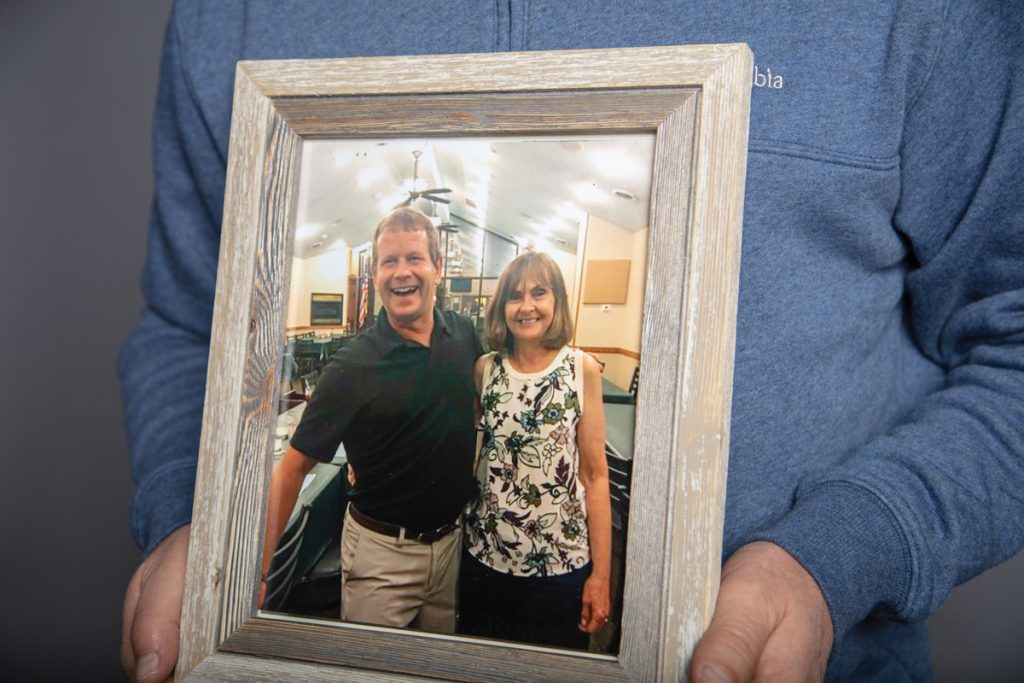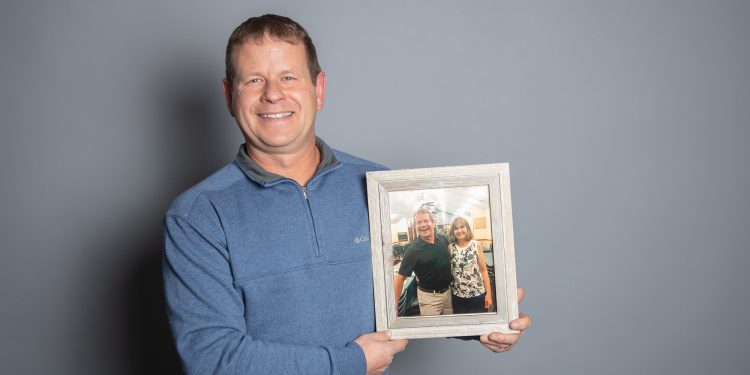Julie Baker read an article in the newspaper a few years ago about a local gentleman that was in need of a bone marrow transplant and an organization called “Be The Match.” Be The Match is operated by the National Marrow Donor Program, which helps manage “the largest and most diverse marrow registry in the world.” Julie said that she and her husband, Kevin, have known several people in their lives that had to undergo bone marrow transplants, so after she read the article, she felt compelled to do something.
“You order a kit at home and swab. How easy is that?” she asked. Although Julie liked the idea and ease of joining the bone marrow registry, she had a health history that prevented her from being eligible to do so. She said she felt a “tugging” to see if Kevin would qualify. After talking it over and praying about it, they registered Kevin, and ordered the kit. They soon learned that Kevin was a perfect match for an anonymous individual.
“We prayed for God’s guidance and answers. We felt compelled by the Spirit that he (Kevin) was to donate and share the gift of life,” Julie said. “To be a light in a dark world, in a dark time in someone else’s life.”
In June of 2013, 60-year-old Karen Lancaster, an oncology nurse from Boston, Massachusetts, was diagnosed with Myelofibrosis, a serious bone marrow cancer that affects the body’s ability to produce blood cells. Typically a high-energy person, Karen soon had to leave her job and found herself spending most of her time on the couch due to fatigue and shortness of breath brought on by anemia (a condition in which the blood doesn’t have enough healthy red blood cells).

Since there is no chemotherapy regimen that can cure Myelofibrosis, Karen was told her only hope for a cure was allogeneic bone marrow transplantation, a process where healthy blood stem cells from a donor are used to replace diseased or damaged bone marrow. Karen’s blood counts soon began to drop and, after being hospitalized for an infection, she met with the transplant doctor at Dana-Faber Cancer Institute in Boston. “I told the doctor I wasn’t a quitter and I wanted to see my grandchildren grow up,” she said.
Each of Karen’s siblings was screened to see if they were a donor match, but none qualified. Karen was placed on the Be The Match registry, knowing it could take months to find the best donor match. After another hospitalization in December, she was placed on round-the-clock antibiotics. Karen’s family, including her mother and siblings, gathered together in her son’s home in New Hampshire for Christmas. “It was very important to me to be with family that Christmas, in case it was my last,” Karen said.
In January of 2014, Karen got the call that a donor had been found that was a perfect match. On February 19, 2015, Karen Lancaster received a bone marrow transplant through an IV. “The whole process is beyond amazing,” Karen said. “Coordinating the donation of the cells, to their transport to me in Boston during snowstorms, and me not knowing where the cells were coming from. It could have been anywhere in the world.” Unbeknownst to her, the cells were donated by Kevin Baker, who lived over 1,000 miles away in Owensboro, Kentucky.
Over three years later, Lancaster is now in remission. In March of 2016, both Karen and Kevin filled out forms in order to learn one another’s identities. That Easter Sunday, Karen said they talked for an hour on the phone. This past summer, Karen and her family made the trip to Owensboro to meet Kevin and his family. Karen said, “Words can’t describe how happy I am to connect with Kevin and his wife, Julie. Like Julie says, we are family now.”
“You order a kit at home and swab. How easy is that?” she asked. Although Julie liked the idea and ease of joining the bone marrow registry, she had a health history that prevented her from being eligible to do so. She said she felt a “tugging” to see if Kevin would qualify. After talking it over and praying about it, they registered Kevin, and ordered the kit. They soon learned that Kevin was a perfect match for an anonymous individual.
“We prayed for God’s guidance and answers. We felt compelled by the Spirit that he (Kevin) was to donate and share the gift of life,” Julie said. “To be a light in a dark world, in a dark time in someone else’s life.”
In June of 2013, 60-year-old Karen Lancaster, an oncology nurse from Boston, Massachusetts, was diagnosed with Myelofibrosis, a serious bone marrow cancer that affects the body’s ability to produce blood cells. Typically a high-energy person, Karen soon had to leave her job and found herself spending most of her time on the couch due to fatigue and shortness of breath brought on by anemia (a condition in which the blood doesn’t have enough healthy red blood cells).
Since there is no chemotherapy regimen that can cure Myelofibrosis, Karen was told her only hope for a cure was allogeneic bone marrow transplantation, a process where healthy blood stem cells from a donor are used to replace diseased or damaged bone marrow. Karen’s blood counts soon began to drop and, after being hospitalized for an infection, she met with the transplant doctor at Dana-Faber Cancer Institute in Boston. “I told the doctor I wasn’t a quitter and I wanted to see my grandchildren grow up,” she said.
Each of Karen’s siblings was screened to see if they were a donor match, but none qualified. Karen was placed on the Be The Match registry, knowing it could take months to find the best donor match. After another hospitalization in December, she was placed on round-the-clock antibiotics. Karen’s family, including her mother and siblings, gathered together in her son’s home in New Hampshire for Christmas. “It was very important to me to be with family that Christmas, in case it was my last,” Karen said.
In January of 2014, Karen got the call that a donor had been found that was a perfect match. On February 19, 2015, Karen Lancaster received a bone marrow transplant through an IV. “The whole process is beyond amazing,” Karen said. “Coordinating the donation of the cells, to their transport to me in Boston during snowstorms, and me not knowing where the cells were coming from. It could have been anywhere in the world.” Unbeknownst to her, the cells were donated by Kevin Baker, who lived over 1,000 miles away in Owensboro, Kentucky.
Over three years later, Lancaster is now in remission. In March of 2016, both Karen and Kevin filled out forms in order to learn one another’s identities. That Easter Sunday, Karen said they talked for an hour on the phone. This past summer, Karen and her family made the trip to Owensboro to meet Kevin and his family. Karen said, “Words can’t describe how happy I am to connect with Kevin and his wife, Julie. Like Julie says, we are family now.”
“You order a kit at home and swab. How easy is that?” she asked. Although Julie liked the idea and ease of joining the bone marrow registry, she had a health history that prevented her from being eligible to do so. She said she felt a “tugging” to see if Kevin would qualify. After talking it over and praying about it, they registered Kevin, and ordered the kit. They soon learned that Kevin was a perfect match for an anonymous individual.
“We prayed for God’s guidance and answers. We felt compelled by the Spirit that he (Kevin) was to donate and share the gift of life,” Julie said. “To be a light in a dark world, in a dark time in someone else’s life.”
In June of 2013, 60-year-old Karen Lancaster, an oncology nurse from Boston, Massachusetts, was diagnosed with Myelofibrosis, a serious bone marrow cancer that affects the body’s ability to produce blood cells. Typically a high-energy person, Karen soon had to leave her job and found herself spending most of her time on the couch due to fatigue and shortness of breath brought on by anemia (a condition in which the blood doesn’t have enough healthy red blood cells).
Since there is no chemotherapy regimen that can cure Myelofibrosis, Karen was told her only hope for a cure was allogeneic bone marrow transplantation, a process where healthy blood stem cells from a donor are used to replace diseased or damaged bone marrow. Karen’s blood counts soon began to drop and, after being hospitalized for an infection, she met with the transplant doctor at Dana-Faber Cancer Institute in Boston. “I told the doctor I wasn’t a quitter and I wanted to see my grandchildren grow up,” she said.
Each of Karen’s siblings was screened to see if they were a donor match, but none qualified. Karen was placed on the Be The Match registry, knowing it could take months to find the best donor match. After another hospitalization in December, she was placed on round-the-clock antibiotics. Karen’s family, including her mother and siblings, gathered together in her son’s home in New Hampshire for Christmas. “It was very important to me to be with family that Christmas, in case it was my last,” Karen said.
In January of 2014, Karen got the call that a donor had been found that was a perfect match. On February 19, 2015, Karen Lancaster received a bone marrow transplant through an IV. “The whole process is beyond amazing,” Karen said. “Coordinating the donation of the cells, to their transport to me in Boston during snowstorms, and me not knowing where the cells were coming from. It could have been anywhere in the world.” Unbeknownst to her, the cells were donated by Kevin Baker, who lived over 1,000 miles away in Owensboro, Kentucky.
Over three years later, Lancaster is now in remission. In March of 2016, both Karen and Kevin filled out forms in order to learn one another’s identities. That Easter Sunday, Karen said they talked for an hour on the phone. This past summer, Karen and her family made the trip to Owensboro to meet Kevin and his family. Karen said, “Words can’t describe how happy I am to connect with Kevin and his wife, Julie. Like Julie says, we are family now.”










